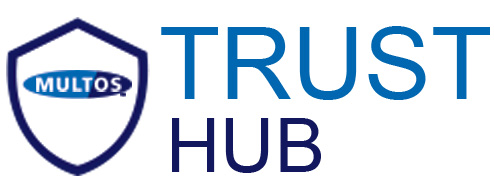Software Support
All the software required to use Trust Hub can be obtained from our software downloads page. Please email us at dev.support@multos.com for an access code.
Windows SmartDeck SDK
Download SmartDeck and install as instructed. Trust Hub devices can then be interacted with in two ways.
Using hterm
The SmartDeck terminal emulator is usually used to communicate with a PCSC smartcard reader (-pcsc option). For the Trust Anchor development kit this was extended to include communications over a USB to serial link (-serial option). For the dongle, the -serial option has been overloaded to support the USB interface. For example, to list the applications loaded on a Trust Hub device using serial port COM5:
- hterm -serial COM5:i2c -dir
Using the COM interface
The COM interface is documented in the SmartDeck manual. It can easily be used from Visual C++ and C# applications. In order to connect to a Trust Hub device, the connectpcsc() method should be passed the COM port details as shown in the following C# example:
using SmartDeckTerminalTypeLib;
…
SmartDeckTerminalComponent term = new SmartDeckTerminalComponent();
term.connectpcsc("COM5:i2c");
term.reset(1);
string directory = term.getdirectory();
Please contact us for more details if you require further assistance with this.
Java™ interface
The Java interface consists of two classes:
- UsbIss: A singleton class that abstracts the USB – I2C interface chip. This makes use of the com.fazecast.jSerialComm package (e.g. jSerialComm-2.8.jar)
- MultosI2C: This class uses the UsbIss class and abstracts the MULTOS i2c command mode transport protocol, providing methods to connect to, reset and send APDUs to the Trust Hub device.
It includes an example that uses the sample Trust Hub application and also contains jSerialComm-2.8.jar.
‘C’ – API and basic tools
The MULTOS Trust Core plug-in board for Raspberry PI comes complete with a set of utility applications and a C API:
- lsm : tool to list the applications that are loaded on Trust Core
- loadm: tool to load a MULTOS application to Trust Core
- deletem: tool to delete a MULTOS application from Trust Core
- libmultosio.so / multosio.h : The C API (also used by the above tools)
Source for these is available from our Github repo and built versions from the software downloads page.
It is possible to use the same tools and API for Trust Hub by using an alternative version of libmultosio.so / multosio.h.
Rebuild if necessary and copy the libmultosio_usb.so file to /usr/lib/libmultosio.so and multosio.h to /usr/include/multosio.h.
It is also possible to build and use these tools on Windows if none of the other options above for Windows are suitable. Please contact us for more details if you are interested in this.

